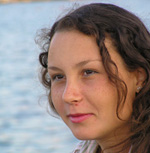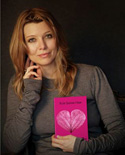 When I first read William Saroyan's 'Why I Write?' When I first read William Saroyan's 'Why I Write?'
I was six years old. And right away I became fascinated by his work. Since then, I've grown more fond of such manifestos. Here are Elif Žafak's reasons in full text at http://www.elifsafak.us/yazilar.asp?islem=yazi&id=31.
As for me, I was more interested in 'writing' than 'being read' back in those days. I kept beautiful diaries, but daily life for me was really so terrible. A diary allows a person to assume her/himself is at the center of the universe. It's all just elaborate talk of "I, I, I" and "me, me, me". However I scribbled down others' life. To be able to say "I" confidently is particular to those who sense loneliness as an individual choice. I, in contrast, had no choice and was surrounded by my fears. For this reason, I write with a strong will to open the doors closed to me. I try to keep the personality clash I have with others a secret, even a secret from God if I could.
Nothing is constant-apples will rot, journals will run out of paper. Glass will shatter and its pieces cannot be reunited. I can't predict exactly in which period of my childhood I started writing; nevertheless I'm sure that my novels are anchored in my youthful spirit. While flying in the vacuum I held on to the smashing pieces. And so, I knew that I belonged to that group which I no longer could bear.
 I was writing because my imaginary world seemed more worth living in than the real world. In reality, I was swimming in the sea with neither a beach in sight nor a compass in hand. I had no friends, no siblings and no father. My presence felt so temporary in this world. That is to say, I realized I would only be here for a short time. For many years, I couldn't rid myself of that feeling. I swung between the tangible world and religious world that my grandmothers inhabited, the one full of revenge. This enabled me to realize at a very young age that there is more than one world, that the God everyone talks about as being so singular has more than two faces. The real issue at hand is transcience, the temporary status of all things. Thus, I can't push death out of life, or even from my writings. The strange thing is why I chose fiction, known as the ideal of permanence, despite relying heavily on transcience. I, myself, don't know the answer yet. I was writing because my imaginary world seemed more worth living in than the real world. In reality, I was swimming in the sea with neither a beach in sight nor a compass in hand. I had no friends, no siblings and no father. My presence felt so temporary in this world. That is to say, I realized I would only be here for a short time. For many years, I couldn't rid myself of that feeling. I swung between the tangible world and religious world that my grandmothers inhabited, the one full of revenge. This enabled me to realize at a very young age that there is more than one world, that the God everyone talks about as being so singular has more than two faces. The real issue at hand is transcience, the temporary status of all things. Thus, I can't push death out of life, or even from my writings. The strange thing is why I chose fiction, known as the ideal of permanence, despite relying heavily on transcience. I, myself, don't know the answer yet.
At Madrid, at the age of eleven, I studied beside English students with whom I had nothing in common. I felt uneasy in my incompatibility. The more I kept to myself, the more they ostracized me. Closing all gates to the outer world, I escaped into a world my mind created. At that time I began to write stories in a form different from how I wrote in my diary. I would speak in Spanish in the streets, at courses in English and take the exams of French and Latin while bitterly longing for my mother tongue. Perhaps, for this reason I now cling to my mother tongue to make up for lost time. A way of atonement, if you will.
The only consistent thing in my life in Madrid was writing. I kept to myself since I couldn't find anyone to share common interests with. Ever since childhood, I liked writing, knew it was a big part of me. I wrote because I was lonely and bitter. Being a writer sometimes counters these unpleasant feelings. I like literature, as it takes me on new paths through personality and memory. I am more fond of writing than I am fond of the idea of being able to call myself a writer. And so, I will continue to write.
By Müge Tekin (IE/IV)
 |







